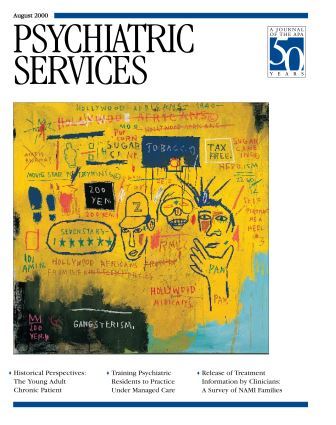This book should be useful to people who need antipsychotic medications, to their families, and to any professionals trying to help them. The lead author, Dr. Weiden, has the knowledge and experience to write such a book. Accurate information on antipsychotic medications is rarely available in such an easily understandable form. The book also has an excellent glossary.
As the title suggests, Breakthroughs in Antipsychotic Medications indeed covers only antipsychotic medications and the drugs intended to control their side effects. It does not discuss antidepressants, antianxiety drugs, antiseizure drugs, or mood stabilizers.
On page 11 a short passage entitled "The Keys to Recovery" explains what the book is about. "Mental illness . . . locks you in," it says, preventing you from doing things and going places and achieving goals. "Antipsychotic medications are the keys" that can unlock the door. Of the many such medications available, you don't know which of these "keys" may unlock the door for you. "Don't give up if the first medication doesn't work," the book says. "Don't keep taking the same medication for years if it doesn't work. There are other medications to try." But the book also cautions later that antipsychotic medications must be taken regularly, in appropriate doses, for a period of time before they begin to work.
The book is not meant to be read through from cover to cover. It is best to begin with the introduction, and especially to note the section called "How to Use This Book." At first I thought the lack of an index was a serious drawback. However, the table of contents is detailed enough to help the reader locate needed information.
People who have little or no knowledge about antipsychotic drugs are advised to begin with part 1, the "Consumer Guide." This section addresses such issues as the difference between symptoms and a diagnosis and the causes of different kinds of symptoms. It describes the types of antipsychotic medications and how they differ from one another. It explains the different kinds of side effects and ways of dealing with them. It provides details on how to switch from one medication to another and how to judge whether such a change might be desirable. However, ultimately, the book notes, these questions must be answered independently by each patient and the family members and providers who are involved with the patient.
A valuable chapter in this section is the one called "Getting On With Life." Here the authors give advice on what to do once the symptoms are under control.
Part 2 provides more technical information about specific new antipsychotics. It also includes tables with information on conventional antipsychotics, usual dosages, and side effects; common symptoms of schizophrenia and how they may respond to medications; reasons to switch to a different medication and reasons to avoid or postpone switching; withdrawal symptoms that may occur on discontinuing an antipsychotic medication; interactions between different medications; and treatment options after a patient has failed to respond to a new medication.
The book also gives good advice about how patients and providers can work together and about how to obtain financial aid to pay for medication.
Breakthroughs in Antipsychotic Medications can certainly be recommended for patients and family members and even clinicians looking for clear, practical, and up-to-date information about antipsychotic drugs.

